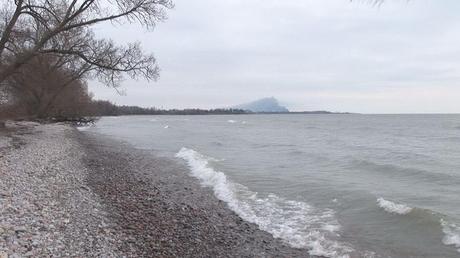
Earlier last fall, Bob and I hiked a trail that was new to us, the Cedar Trail in Rouge National Park, Toronto. We were amazed at how remote it felt when in amongst the forests and wetlands.

There are numerous ponds that have formed in the wetlands, where we have seen beavers, and a wide variety of waterfowl.

Bob atop a century’s old tree stump, a remnant from logging days in the past.

Before we reached the largest pond, the cacophony of bird calls announced the presence of hundreds of Canada Geese and a variety of ducks.

In amongst the Canada Geese were several pairs of Bufflehead Ducks (Bucephala albeola) although at first glance, they were difficult to pick out given that their plumage and markings greatly resembled those of the geese, not to mention some Common Goldeneye Ducks (Bucephala clangula) that we also spotted.

We had never seen this type of duck before, but upon returning home, we learned that they are big-headed diving ducks that usually spend summers in Alaska and northern parts of the western provinces of Canada. Seeing as they winter primarily along either the eastern or western seaboards of Canada and the United States, we surmised that this flock of Buffleheads was in active migration. Here we see a male, with the predominant “scarf” around its head, while the female has a white splash across her cheek.

In this video that Bob filmed, you see the Bufflehead Ducks swimming and playing amongst the Canada Geese at Rouge National Park .

Just days ago, Bob and I visited the Lynde Shores Conservation Area in Whitby, Ontario. It was an unusually warm day for the middle of January.

On this visit, we walked the West Cranberry Tract, a trail that circles the Cranberry Marsh and leads visitors to the shore of Lake Ontario. The first thing we noticed on the horizon was a massive plume of black smoke. A fire at an asphalt plant in Oshawa turned out to be the source of the billowing pillar of smoke.

With the waves thundering to shore nearby, Bob and I paused for a moment to enjoy the otherwise serene setting.

Just offshore, a flock of myriad waterbirds was clustered together, while closer to shore some black and white ducks bobbed on the waves.

When we got a closer look, and identified them to be Bufflehead Ducks, we were quite surprised to see them still here in Canada in the depths of winter. Normally, Bufflehead Ducks would be much further south, wintering on smaller lakes or shallow bays. Could it be that climate change is affecting their migratory habits?

I guess now that the ponds in Rouge National Park are frozen over, the Buffleheads had to find alternate bodies of water to live on. This male Bufflehead appears to be looking into the depths in search of a possible catch.

With the ducks disappearing time and again beneath the waves or into the troughs of water, we had to be persistent in order to grab a few photos.
In this video you see both the fire in Oshawa, and also the Bufflehead Ducks going about their day, upwind on Lake Ontario.

As we withdrew from the shoreline, we were relieved that the onshore winds were gusting from the southwest, carrying the toxic clouds of smoke away from this sensitive wetland preserve in Whitby. I hope that the birds and animals downwind of the fire were not negatively impacted by the thick black fog washing over the land.
Frame To Frame.ca

